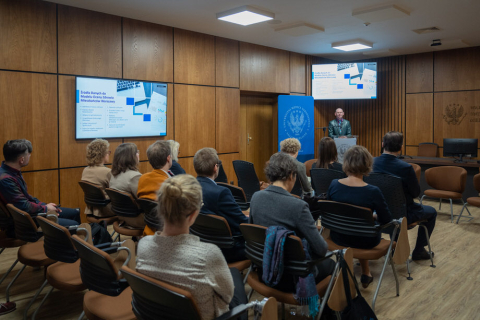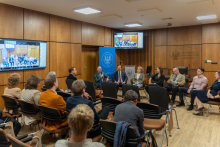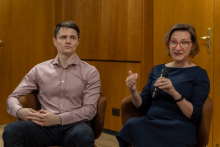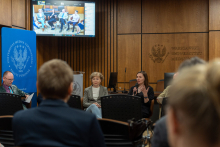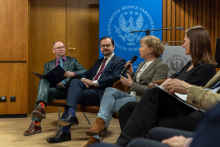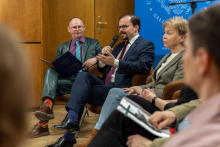The meeting was opened by Professor Joanna Gotlib-Małkowska, and the debate was moderated by Professor Mariusz Panczyk. The meeting brought together experts from various health fields and representatives of international health organizations, including the World Health Organization and the Partnership for Healthy Cities, a global initiative that supports local governments in designing and implementing health policies focused on improving the health and quality of life of urban residents.
Presentation of #Evidence-based Warsaw's Health project
The debate began with an introduction by Prof. Mariusz Panczyk, who presented a model for assessing the surveillance and monitoring of the health status of Warsaw residents, which is a key element of the #Evidence-based Warsaw's Health project. The project is being implemented as part of the cooperation between the City of Warsaw and the Partnership for Healthy Cities.
- Good data is the foundation of good policy decisions, and our city is at the forefront of initiatives to turn theoretical considerations and analysis into concrete action - Prof. Panczyk stressed in his lecture.
Panel of experts
The panel discussion featured six experts from different specialties. Their diverse experiences and perspectives allowed for a comprehensive discussion of the challenges and opportunities of public health in the specific conditions of the urban environment. This multifaceted perspective highlighted the complexity of the problems and the variety of potential solutions that can be applied to improve the quality of life for urban residents.
Dr. Tomasz Tatara (Department of Public Health MUW and the Agency for Health Technology Assessment and Tarification) noted the importance of reliable data in shaping effective health policy:
- Our activities must be based on solid data to effectively address the health needs of residents. By working with local authorities, we strive to create health programs that are not only effective, but also tailored to the specifics of the city.
Dr. Przemysław Rzodkiewicz (Chief Inspector of Commercial Quality of Agricultural and Food Products) emphasized:
- The key to success in health promotion lies in the synergy between theoretical assumptions and practice. Only then can we achieve the desired change.
Prof. Marta Mańczuk (National Cancer Institute) discussed the challenges of non-communicable diseases, which are particularly common in urban environments:
- Urban living carries specific risks, such as air and noise pollution. Effective primary prevention, based on solid data, must be a priority in our health efforts.
Prof. Violetta Korporowicz-Żmichowska (Warsaw School of Economics) noted how innovation can transform urban health management:
- Innovative approaches in public health management can significantly improve the quality of life for residents. These innovations should be supported by solid data and research, allowing for more effective adaptation of new approaches.
Dr. Mirosław Grochowski (University of Warsaw) emphasized the impact of urban planning on the health of residents:
- How we design our cities is how we shape the health of our residents. Good urban planning should encourage the creation of spaces that promote healthy lifestyles.
- Caring for the health of pregnant women and newborns is an investment in the future of society as a whole. The quality of this care has a direct impact on the health of future generations. - said Professor Barbara Baranowska (Center for Postgraduate Medical Education), who focused on the issue of perinatal care as a key element of public health.
Summary of the debate
The debate concluded with a discussion of how different sectors can work together to collect and use data that will form the basis for effective health interventions.
- It is through cooperation on many levels that we can make a real difference in improving the health of urban residents - said Prof. Panczyk, summing up the event.
The event marked an important step on the part of MUW in promoting public health and healthcare innovation locally and internationally. It is noteworthy that the collaboration with the Partnership for Healthy Cities, supported by Bloomberg Philanthropies, the World Health Organization and Vital Strategies, aims to create healthy urban environments that contribute to the health and safety of residents through effective interventions and policies on non-communicable diseases and injury prevention.
